Regulatory T cells suppress the formation of potent KLRK1 and IL-7R expressing effector CD8 T cells by limiting IL-2
- PMID: 36705564
- PMCID: PMC9977273
- DOI: 10.7554/eLife.79342
Regulatory T cells suppress the formation of potent KLRK1 and IL-7R expressing effector CD8 T cells by limiting IL-2
Abstract
Regulatory T cells (Tregs) are indispensable for maintaining self-tolerance by suppressing conventional T cells. On the other hand, Tregs promote tumor growth by inhibiting anticancer immunity. In this study, we identified that Tregs increase the quorum of self-reactive CD8+ T cells required for the induction of experimental autoimmune diabetes in mice. Their major suppression mechanism is limiting available IL-2, an essential T-cell cytokine. Specifically, Tregs inhibit the formation of a previously uncharacterized subset of antigen-stimulated KLRK1+ IL-7R+ (KILR) CD8+ effector T cells, which are distinct from conventional effector CD8+ T cells. KILR CD8+ T cells show superior cell-killing abilities in vivo. The administration of agonistic IL-2 immunocomplexes phenocopies the absence of Tregs, i.e., it induces KILR CD8+ T cells, promotes autoimmunity, and enhances antitumor responses in mice. Counterparts of KILR CD8+ T cells were found in the human blood, revealing them as a potential target for immunotherapy.
Keywords: IL-2; T cells; autoimmunity; cytotoxic; immune suppression; immunology; inflammation; mouse; regulatory T cells.
Plain language summary
As well as protecting us from invading pathogens, like bacteria or viruses, our immune system can also identify dangerous cells of our own that may cause the body harm, such as cancer cells. Once detected, a population of immune cells called cytotoxic T cells launch into action to kill the potentially harmful cell. However, sometimes the immune system makes mistakes and attacks healthy cells which it misidentifies as being dangerous, leading to autoimmune diseases. Special immune cells called T regulatory lymphocytes, or ‘Tregs’, can suppress the activity of cytotoxic T cells, preventing them from hurting the body’s own cells. While this can have a positive impact and reduce the effects of autoimmunity, Tregs can also make the immune system less responsive to cancer cells and allow tumors to grow. But how Tregs alter the behavior of cytotoxic T cells during autoimmune diseases and cancer is poorly understood. While multiple mechanisms have been proposed, none of these have been tested in living animal models of these diseases. To address this, Tsyklauri et al. studied Tregs in laboratory mice which had been modified to have autoimmune diabetes, which is when the body attacks the cells responsible for producing insulin. The experiments revealed that Tregs take up a critical signaling molecule called IL-2 which cytotoxic T cells need to survive and multiply. As a result, there is less IL-2 molecules available in the environment, inhibiting the cytotoxic T cells’ activity. Furthermore, if Tregs are absent and there is an excess of IL-2, this causes cytotoxic T cells to transition into a previously unknown subset of T cells with superior killing abilities. Tsyklauri et al. were able to replicate these findings in two different groups of laboratory mice which had been modified to have cancer. This suggests that Tregs suppress the immune response to cancer cells and prevent autoimmunity using the same mechanism. In the future, this work could help researchers to develop therapies that alter the behavior of cytotoxic T cells and/or Tregs to either counteract autoimmune diseases, or help the body fight off cancer.
© 2023, Tsyklauri et al.
Conflict of interest statement
OT, TC, VN, JK, JM, IM, SJ, OI, HR, AD, HV, VG, MK, OS No competing interests declared
Figures
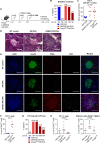

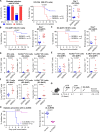
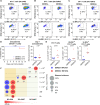





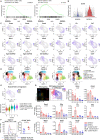
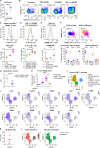
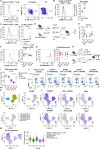
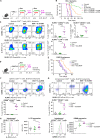


Update of
- doi: 10.1101/2021.11.10.467495
Similar articles
-
Enhanced suppression of polyclonal CD8+25+ regulatory T cells via exosomal arming of antigen-specific peptide/MHC complexes.J Leukoc Biol. 2017 May;101(5):1221-1231. doi: 10.1189/jlb.3A0716-295RR. Epub 2017 Jan 17. J Leukoc Biol. 2017. PMID: 28096300
-
Regulatory T-cell-derived interleukin-15 shapes cytotoxic T cell memory.Eur J Immunol. 2023 Jan;53(1):e2250238. doi: 10.1002/eji.202250238. Epub 2022 Dec 8. Eur J Immunol. 2023. PMID: 36398486
-
Stem cell-derived tissue-associated regulatory T cells suppress the activity of pathogenic cells in autoimmune diabetes.JCI Insight. 2019 Apr 4;4(7):e126471. doi: 10.1172/jci.insight.126471. eCollection 2019 Apr 4. JCI Insight. 2019. PMID: 30777937 Free PMC article.
-
<Editors' Choice> Meddling with meddlers: curbing regulatory T cells and augmenting antitumor immunity.Nagoya J Med Sci. 2019 Feb;81(1):1-18. doi: 10.18999/nagjms.81.1.1. Nagoya J Med Sci. 2019. PMID: 30962651 Free PMC article. Review.
-
IL-2-driven CD8+ T cell phenotypes: implications for immunotherapy.Trends Immunol. 2023 Nov;44(11):890-901. doi: 10.1016/j.it.2023.09.003. Epub 2023 Oct 10. Trends Immunol. 2023. PMID: 37827864 Free PMC article. Review.
Cited by
-
Age-Dependent Bi-Phasic Dynamics of Ly49+CD8+ Regulatory T Cell Population.Aging Cell. 2025 Apr;24(4):e14461. doi: 10.1111/acel.14461. Epub 2024 Dec 18. Aging Cell. 2025. PMID: 39696807 Free PMC article.
-
ABIN1 is a negative regulator of effector functions in cytotoxic T cells.EMBO Rep. 2024 Aug;25(8):3456-3485. doi: 10.1038/s44319-024-00179-6. Epub 2024 Jun 14. EMBO Rep. 2024. PMID: 38877170 Free PMC article.
-
Tumor-specific draining lymph node CD8 T cells orchestrate an anti-tumor response to neoadjuvant PD-1 immune checkpoint blockade.bioRxiv [Preprint]. 2025 Jun 1:2025.04.27.650862. doi: 10.1101/2025.04.27.650862. bioRxiv. 2025. PMID: 40501950 Free PMC article. Preprint.
-
Single-Cell RNA Sequencing of Ewing Sarcoma Tumors Demonstrates Transcriptional Heterogeneity and Clonal Evolution.Clin Cancer Res. 2025 May 15;31(10):2010-2023. doi: 10.1158/1078-0432.CCR-24-2040. Clin Cancer Res. 2025. PMID: 40029262
-
A glimpse into the application of the immunomodulatory effect of IL-2 in systemic lupus erythematosus.Front Med (Lausanne). 2025 Apr 23;12:1552473. doi: 10.3389/fmed.2025.1552473. eCollection 2025. Front Med (Lausanne). 2025. PMID: 40337274 Free PMC article. Review.
References
-
- Akkaya B, Oya Y, Akkaya M, Al Souz JA, Holstein AH, Kabat J, Kamenyeva O, Dorward D, Glass D, Shevach EM. Regulatory T cells perform antigen specific suppression by depleting cognate peptide-MHC class II via trogocytosis. The Journal of Immunology. 2019;202:57. doi: 10.4049/jimmunol.202.Supp.57.17. - DOI - PMC - PubMed
Publication types
MeSH terms
Substances
Associated data
- Actions
Grants and funding
LinkOut - more resources
Full Text Sources
Medical
Molecular Biology Databases
Research Materials

